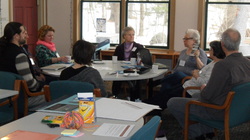
We began day two of our 2 1/2 day first institute (after a wonderful tour of James Hall and the Scheier displays at Dimond Library on the UNH campus) this morning with participants sharing artifacts they use in their teaching. Teachers and faculty talked about curricula they use, assignments they've given to students, media they use to inspire (like NPR's This I Know), even rocks they've collected from hikes. The diversity of the artifacts was fascinating, but all showed how participants are developing purposeful curricula to engage their students in big issues and topics but in ways that connect to them personally - stories, passport boxes, films, etc. The compassion the participants have for their students is evident.
Questions came out that are tied directly to sustainability: how do we help our students learning to trust, how do we help create a sense of place and community with our students, what stories help connect students to larger issues and questions? These questions are crucial and will lead us into the rest of the day.
I tried to put it in the resources, but I'm pretty website illiterate..
If you haven't seen these books, we should check them out--to get ideas, see what others are doing, and avoid reinventing the wheel so to speak.
I have one of the 'Making Connections' books I can bring in. I've only used it once.. and it was an extension activity because my classes were thrown off by testing. So I'm thinking that's one area we/I need to figure out: how this can fit in to the 'official' curriculum.
-Sam Perron
Hello Everyone! This Institute seems like an exciting opportunity to explore ideas which have, thus far, remained subliminal to my teaching. There’s always a movie like The Last Mimsy or a novel like Hunger Games (and many, many classics) pushing the envelope of how we consider our foreseeable future. I’ve always wanted to push the requisite research paper a little bit further than the typical English 101 paper on “Global Warming.” As an English teacher, it’s empowering to realize that there are implications among the Grand Challenges for composition, literature, communications, and many others; through these courses we have the opportunity to enrich and enhance student understanding of the Grand Challenges and move these ideas forward. At the community college level, we have the opportunity to work with students “from all walks” as they begin their professional journey and encourage them to “better understand the factors shaping individual behavior, values and perceptions of threats and risks” (15) as it pertains to global change and collective action. Teaching students to think, to be proactive, and to think beyond their immediate sphere of influence is a challenge – putting these ideas into a context such as sustainability makes it that much more interesting and engaging. I’m looking forward to this Institute as an opportunity to grow and explore. --Amanda Eason, SLC participant.
Our very first institute is March 1-3, 2013, on the UNH Durham campus, and we are excited to have you on board for this journey.
This blog is for SLC participants to share what they are learning, ask and answer each other's questions, share ideas, and reflect on the entire process of designing sustainability pedagogy, curricula and assessment strategies for their classrooms.
SLC participants: this is YOUR website and YOUR blog! Start writing, start challenging yourself and each other, and we'll take these ideas and questions and use them at future institutes. You can use them as well as you develop your pedagogy, curricula and assessments.
We at the Sustainability Institute at UNH are thrilled to have this opportunity to work with and learn from you. Sustainability is a big idea. It demands collaboration, a transdisciplinary perspective, and many, many hearts and minds working together to make it happen. We thank you for taking the time out of your busy lives to be part of this new project. We know we will learn so much from each of you, building relationships that last well beyond the life of this project and that will push sustainability forward for our students, the next generation of sustainability leaders.
Welcome to our sustainability learning community!
Sara Cleaves, UNHSI

 RSS Feed
RSS Feed